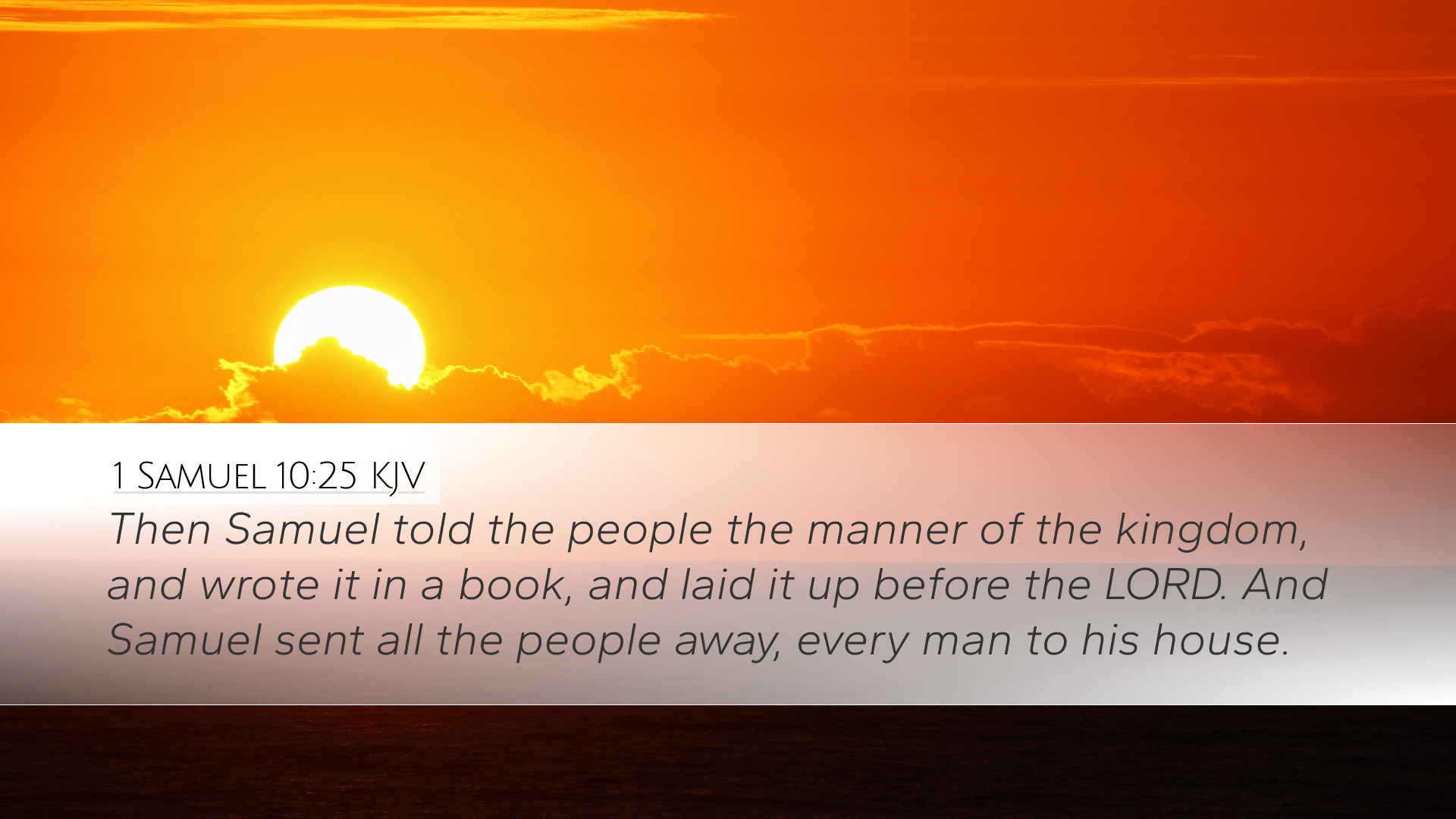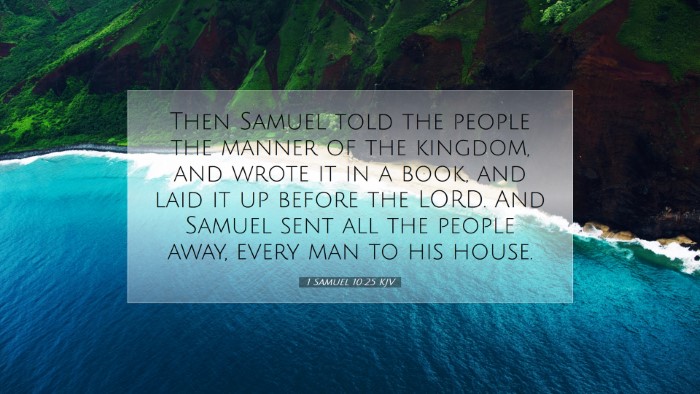Commentary on 1 Samuel 10:25
Bible Verse: 1 Samuel 10:25 - "Then Samuel told the people the manner of the kingdom, and wrote it in a book, and laid it up before the Lord. And Samuel sent all the people away, every man to his house."
Introduction
The appointment of Saul as king marks a significant transition in the history of Israel, moving from theocracy to monarchy. In this verse, we witness the finality of Saul's anointing and the establishment of the nation's government structure. The implications of this moment are profound, not only for the people of Israel at that time but also for future generations as they reflect on the nature of leadership and divine guidance.
Summary of Public Domain Commentaries
Matthew Henry's Commentary
Henry emphasizes that Samuel's function was not merely to anoint the king but also to educate the people about the responsibilities inherent in a monarchy. He interprets "the manner of the kingdom" as the laws and practices that would govern the behavior of the king and the citizens, analogously connecting it to the covenantal relationship between God and Israel. Samuel's writing of this information in a book demonstrates the need for accountability and clarity in leadership.
Moreover, Henry points out that by laying the book up before the Lord, Samuel signifies that the ordinance of God needs divine oversight. This act not only reinforced that God is sovereign over Israel’s government but also that the remembrance of their covenant with God is paramount. Henry concludes that this reflects a divine order and a reminder for the people to remain faithful to the stipulations set by God.
Albert Barnes' Notes on the Bible
Barnes elaborates on the procedural aspects of Samuel's actions. He accentuates the significance of Samuel's instruction to the people regarding the workings of the monarchy, detailing everything from the rights of the king to the duties expected from the citizens. Barnes notes the importance of the book as a historical record that affirms both the authority of Saul as king and the legal framework of his authority.
Furthermore, Barnes reflects on the communal aspect of the event, highlighting that after the proclamation of the king, each individual returned home. This signifies a personal responsibility amongst the citizens to reflect on their new political reality and their roles in fulfilling the conditions of this monarchy. The action demonstrates a shift not only in governance but also in the Israelites' personal lives, pushing them to adapt to the newfound order.
Adam Clarke's Commentary
Clarke focuses on the theological implications of the transition from a theocratic to a monarchical system. He interprets "wrote it in a book" as an essential act of establishing a new legal framework that would guide the nation under the new king. Clarke emphasizes that this book serves as a witness to the covenant established between God and the throne of Israel.
Additionally, Clarke discusses the emotional and spiritual state of the people as they depart. The dismissal of the people to their homes can be seen as a quiet moment of contemplation where they must reckon with their choice of a king. The societal implications of this decision hold weight, as it shifts reliance from divine providence to human governance, challenging their faith in God's plans.
Theological Reflections
1 Samuel 10:25 is a pivotal verse that encapsulates the essence of leadership as ordained by God. Here, the insights from the commentaries converge to illustrate a multifaceted understanding of governance in spiritual terms:
- Divine Sovereignty: The establishment of kingship is not without God’s oversight. It affirms that all authority derives from Him, and leaders are accountable to divine standards.
- Human Responsibility: The verse underscores the duty of the people to adhere to the conditions of their kingship and the covenant with God, reflecting an intricate relationship between governance and faith.
- Historical Continuity: By inscribing the manner of kingship, this act ensures that future generations are aware of their history and God’s dealings with Israel, thereby fostering an enduring legacy of faith and responsibility.
Conclusion
In 1 Samuel 10:25, the confluence of divine instruction and human choice reveals significant truths about leadership and community. Samuel's actions, as interpreted by Henry, Barnes, and Clarke provide a rich tapestry of understanding that encourages pastors, students, and scholars to reflect deeply on their roles within the framework of divine authority.
This passage serves as a reminder of the complexities inherent in governance and faith—a call to uphold integrity and fidelity to God's commands while navigating the challenges posed by human institutions. As the Church continues to evolve, the lessons drawn from this pivotal moment in Israel’s history remain relevant, guiding contemporary believers in their pursuit of godly leadership and active participation in their communities.


